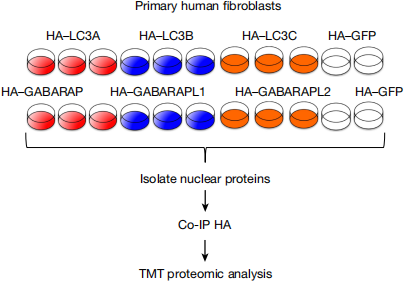-----A New Nuclear Autophagy Target WSTF Heralds the Era of Precision Anti-Inflammation
[ Introduction]
Acute inflammation is a "vanguard" safeguarding health, while chronic inflammation is a "silent killer" undermining the body. How to only dampen the slow burn without extinguishing the acute response? A study published in Nature offers a textbook answer: nuclear autophagy specifically amplifies chronic inflammation by degrading the chromatin remodeling protein WSTF. Blocking this process significantly alleviates various chronic diseases such as MASH and osteoarthritis in mouse models, without affecting acute immune responses at all. Today, we’ll walk you through this milestone in "precision anti-inflammation" in just 5 minutes.
Original link: https://www.nature.com/articles/s41586-025-09234-1
1.Key Research Highlights
① It is the first discovery that "nuclear autophagy"-mediated selective degradation of WSTF only occurs in chronic inflammatory environments (aging, MASH, OA, etc.), with no such effect in acute stimuli (LPS, IFNβ).
② WSTF deficiency leads to chromatin opening, which triggers unrestrained NF-κB activation and a surge in inflammatory factors such as IL-6, IL-8, and MMP3.
③ A cell-penetrating peptide NLS-CPP-WSTF was designed to competitively block the binding of WSTF to the autophagic protein GABARAP, stabilizing WSTF protein and significantly reducing liver fibrosis and articular cartilage damage in mouse.
④ Validation in human MASH/OA patient tissues shows that the lower the nuclear level of WSTF, the higher the inflammation score, establishing a direct clinical correlation.
2.Experimental Methods Breakdown
|
Technical Route |
Purpose |
Highlighted Data |
|
TMT-MS + Nuclear-Cytoplasmic Fractionation |
Screen for nuclear ATG8-binding proteins |
Identified WSTF as a "common target" |
|
ATAC-seq |
Assess chromatin accessibility |
WSTF overexpression effectively inhibits the activation of chronic inflammation-related genes |
|
Cell-Penetrating Peptide |
Intervene in WSTF degradation |
Chronic inflammatory factors reduced by 70%, while the acute IFN pathway remained unchanged |
|
Three Mouse Models |
Verify therapeutic value |
Effective in MASH, OA, and NRAS-driven liver cancer |



3.Significance
Traditional immunosuppressants adopt a "one-size-fits-all" approach, suppressing both acute and chronic inflammation simultaneously and carrying a high risk of infection. This study provides a new idea of "only applying the slow brake": precise intervention at the upstream chromatin level with fewer side effects. In the future, it may be used for the combined intervention of multiple aging-related diseases.
4.Research Benefits
Want to quickly validate the WSTF-nuclear autophagy pathway?
【ReedBiotech Chronic Inflammatory Factor ELISA Kit Series】is ready to help you complete relevant validations quickly and reproduce Nature-level data with confidence.
|
Target |
Catalog Number |
Sensitivity |
Detection Range |
|
IL-6 |
RE3186MG |
0.2 pg/mL |
1.56-100 pg/mL |
|
IL-8 (Mouse Homolog CXCL1) |
RE1026MF |
5.22 pg/mL |
15.63-1000 pg/mL |
|
TNF-α |
RE1060M |
0.27 pg/mL |
0.94-60 pg/mL |
|
MCP-1 |
RE2731M |
0.22 pg/mL |
1.56-100 pg/mL |
|
MMP13 |
RE2745M |
46.88 pg/mL |
78.13-5000 pg/mL |
|
TGF-β1 |
RE10013 |
18.75 pg/mL |
31.25-2000 pg/mL |
When order ReedBiotech ELISA kits, you will also receive:
•Practical small gifts
•One-on-one technical support throughout the process
*Making SCI-level data within reach!
[Final Thoughts]
Anti-inflammation has entered the "precision" era, providing new therapeutic ideas for the research of OA, MASH, aging, and more. Grasping WSTF means seizing the "Achilles' heel" of chronic inflammation.
